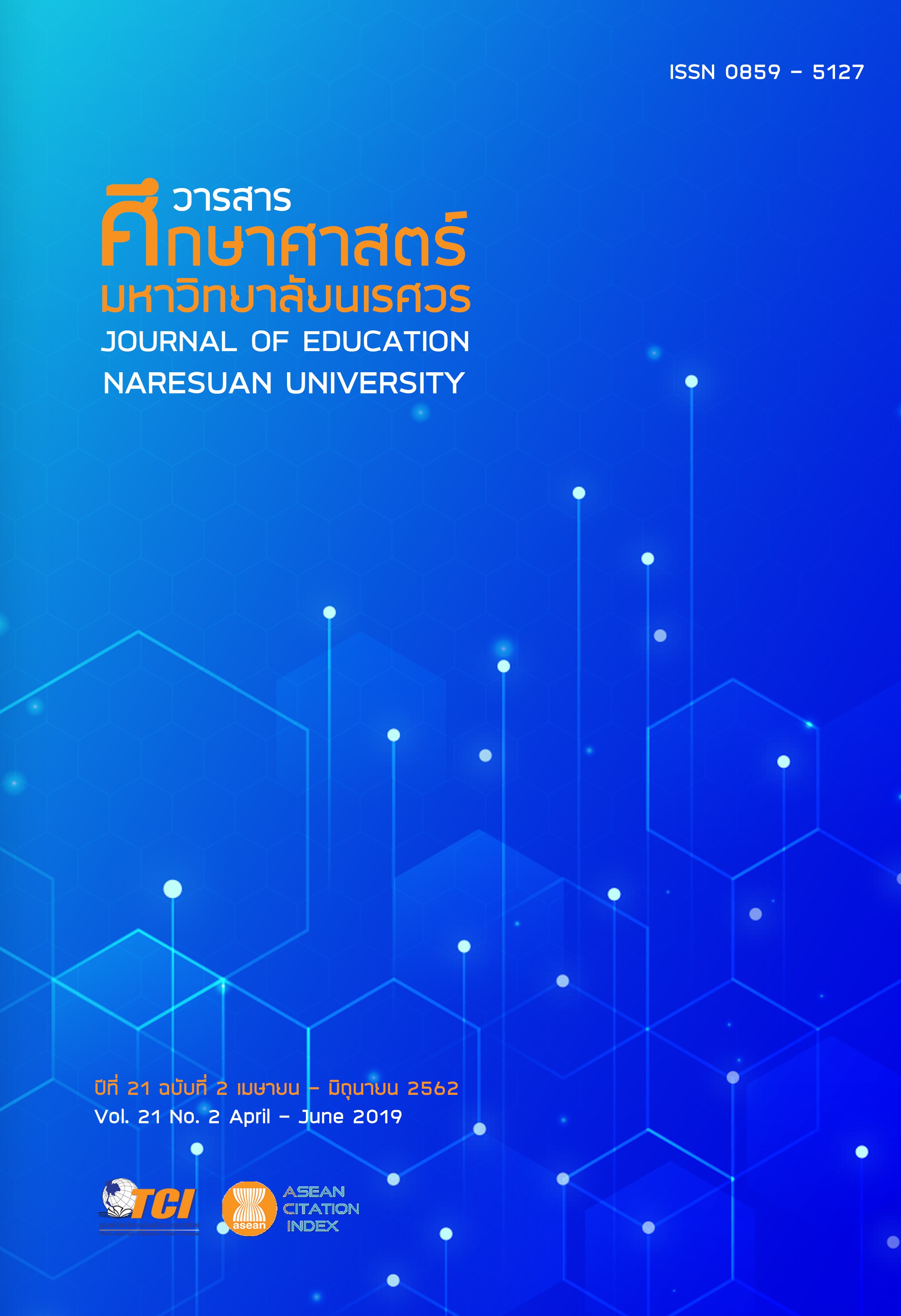ปัจจัยที่ส่งผลต่อภาวะผู้นำเชิงจริยธรรมของผู้บริหารสถานศึกษาขั้นพื้นฐานสังกัดสำนักงานคณะกรรมการการศึกษาขั้นพื้นฐาน (FACTORS AFFECTING ETHICAL LEADERSHIP OF BASIC EDUCATION SCHOOL ADMINISTRATORS UNDER THE OFFICE OF THE BASIC EDUCATION COMMISSION)
Main Article Content
Abstract
การวิจัยมีวัตถุประสงค์เพื่อ ศึกษาองค์ประกอบภาวะผู้นำเชิงจริยธรรมและปัจจัยที่ส่งผลต่อภาวะผู้นำเชิงจริยธรรมของผู้บริหารสถานศึกษา ศึกษาอิทธิพลของปัจจัยที่ส่งผล และนำเสนอข้อเสนอเชิงนโยบายการพัฒนาภาวะผู้นำเชิงจริยธรรม กลุ่มตัวอย่าง คือ ผู้อำนวยการสถานศึกษา 215 คน ผู้ให้ข้อมูลเชิงปริมาณเป็นผู้อำนวยการสถานศึกษา 215 คน และรองผู้อำนวยการสถานศึกษาหรือครู 860 คน และผู้ให้ข้อมูลเชิงคุณภาพเป็นผู้ทรงคุณวุฒิ 9 คน โดยการสัมภาษณ์เชิงลึก และผู้เชี่ยวชาญ 8 คน โดยการสัมมนาอ้างอิงผู้เชี่ยวชาญ เครื่องมือการวิจัยเป็นแบบสอบถามภาวะผู้นำเชิงจริยธรรมและปัจจัยที่ส่งผลต่อภาวะผู้นำเชิงจริยธรรม มีค่าความเที่ยง .96 และ .95 แนวคำถามการสัมภาษณ์เชิงลึก และแนวคำถามสัมมนาอ้างอิงผู้เชี่ยวชาญ วิเคราะห์ข้อมูลด้วยการวิเคราะห์เนื้อหา การวิเคราะห์องค์ประกอบเชิงยืนยัน และการวิเคราะห์โมเดลสมการโครงสร้าง ผลการวิจัย พบว่า 1) ภาวะผู้นำเชิงจริยธรรม ประกอบด้วย การมีวินัย การประพฤติปฏิบัติตนเป็นแบบอย่างที่ดี การดำรงชีวิตอย่างเหมาะสม ความรักและศรัทธาในวิชาชีพ และความรับผิดชอบในวิชาชีพ 2) ปัจจัยที่ส่งผลต่อภาวะผู้นำเชิงจริยธรรม ประกอบด้วย การมีบุคคลต้นแบบและได้ร่วมงานกับบุคคลที่มีจริยธรรม การได้รับการส่งเสริมจริยธรรมจากสถาบันทางสังคม การอยู่ในสิ่งแวดล้อมทางสังคมที่ส่งเสริมจริยธรรม การมีคุณลักษณะของตนเองที่เอื้อต่อการพัฒนาจริยธรรม สถานศึกษามีบรรยากาศองค์การ ปทัสถานทางสังคม วัฒนธรรมองค์การเน้นจริยธรรม และมีระบบการให้รางวัลและการลงโทษด้านจริยธรรม 3) ปัจจัยมีอิทธิพลทางบวกต่อภาวะผู้นำเชิงจริยธรรม และ 4) ข้อเสนอเชิงนโยบายเพื่อพัฒนาภาวะผู้นำเชิงจริยธรรม ได้แก่ พัฒนาสถานศึกษาเป็นองค์การเน้นจริยธรรม พัฒนาคุณลักษณะของตนเอง ส่งเสริมบทบาทของสถาบันทางสังคม พัฒนาบุคคลแวดล้อม และปรับสิ่งแวดล้อมทางสังคมให้เอื้อต่อการพัฒนาจริยธรรม
FACTORS AFFECTING ETHICAL LEADERSHIP OF BASIC EDUCATION SCHOOL ADMINISTRATORS UNDER THE OFFICE OF THE BASIC
The purposes of this research were to study ethical leadership components and factors affecting ethical leadership, to study the influences of factors affecting ethical leadership of administrators; and to propose policy recommendations for development of ethical leadership. Quantitative research informants consisted of the 215 school administrators, and 860 teachers/deputy, while qualitative research informants consisted of nine specialists for in-depth interviews and eight experts who participated in a connoisseurship seminar. The employed research instruments of questionnaires to assess ethical leadership and factors affecting ethical leadership with reliability coefficients of .96 and .95 respectively, a form containing guidelines for in-depth interviews and a form containing guidelines for connoisseurship seminar on feasibility of policy. Data were analyzed using content analysis; confirmatory factor analysis and structural equation model analysis.
Article Details
The owner of the article does not copy or violate any of its copyright. If any copyright infringement occurs or prosecution, in any case, the Editorial Board is not involved in all the rights to the owner of the article to be performed.
References
2. Bhanthumnavin, D. (2008). A research synthesis of moral and ethics in Thailand and other countries. Bangkok: Bangkok: Office of Knowledge Management and Development. [in Thai]
3. Buasri, S. (2009). Taproot of education. Bangkok: Publishing Center Srinakharinwirot University. [in Thai]
4. Chenaksara, N. (2010). Innovation educational administration. In Theory and practice in educational administration. Nonthaburi: The Office of the University Press Sukhothai Thammathirat Open University. [in Thai]
5. Department of Religious Affairs. (2007). Plan for enhancing moral and ethics based on philosophy of sufficiency economy B.E. 2550. Bangkok: The Agricultural Cooperative Federation of Thailand. [in Thai]
6. Iamsupasit, S. (1996). Theories and techniques in behavior modification. Bangkok: Chulalongkorn University. [in Thai]
7. Jongstityoo, C., & Sukhaphirom, R. (2007). A research synthesis report of characteristics and process in developing moral and ethics in various countries. Bangkok: Office of Knowledge Management and Development. [in Thai]
8. Lussier, R. N. & Achua, C. R., (2007). Effective leadership. Canada: Transcontinental Louiseville, Quebec.
9. Mang-Ana, E., & Wannasri, J. (2016). Competencies and ways of development for administrators in world-class standard school. Journal of Education Naresuan University, 18(3), 98-111. [in Thai]
10. Manyat, S. (2011). A structural equation model of factors affecting ethical leadership of school administrators under the department of local administration (Doctoral dissertation). Khon Kaen: Khon Kaen University. [in Thai]
11. Office of the Basic Education Commission. (2016). A handbook for performance achievement evaluation of school directors under office of the basic education commission in one year. Bangkok: n.p. [in Thai]
12. Office of the Permanent Secretary, Ministry of Education. (2013). Revealing statistics of punishment on government officials in B.E. 2553-2555. Retrieved November 15, 2013, from http://www.bict.moe.go.th/modules.php?name=News&file=article&sid=5162 [in Thai]
13. Phetchum, P., Ngamkanok, S., & Chamnan, S. (2016). Leadership types of school administrators influencing learning organization disciplines of schools in Pongnamron District under the office of Chanthaburi Primary Educational Service Area 2. Journal of Education Naresuan University, 18(3), 303 - 314. [in Thai]
14. Phillips, J. M. & Gully, S. M., (2012). Organization behavior tools for success. South-Western. Mellissa, Acuna.
15. Sarrattana, W. (2010). Concept, theory, and issue in educational administration (8th ed.). Bangkok: Thipayawisut. [in Thai]
16. Tantirotchanawong, S., & Tawisuwan, S. (2009). Effective moral development: A case study in children/juvenile and government officials. Bangkok: Department of Religious Affairs, Ministry of Culture Thailand. [in Thai]
17. Thongkamhaeng, K. (2011). Strategies for the development of moral leadership for private school administrators (Doctoral dissertation). Bangkok: Chulalongkorn University. [in Thai]
18. Wisalaporn, S. (2007). Leadership. In Theory and practice in educational administration. Nonthaburi: The Office of the University Press Sukhothai Thammathirat Open University. [in Thai]


